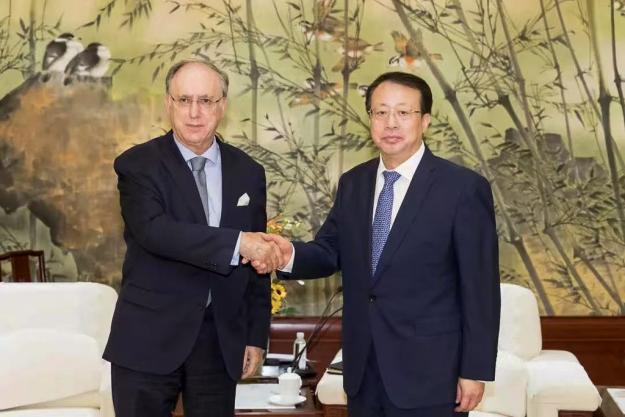
Ambassador Fernando Arias, Director-General of the Organisation for the Prohibition of Chemical Weapons (OPCW), and H.E. Mr. Gong Zheng, Mayor of Shanghai, during an official visit to Shanghai, People’s Republic of China, from 16 to 18 June 2025.
THE HAGUE, Netherlands—24 June 2025—The Director-General of the Organisation for the Prohibition of Chemical Weapons (OPCW), Ambassador Fernando Arias paid an official visit to Shanghai, the People’s Republic of China, from 16 to 18 June. Director-General Arias had meetings with high-level Chinese officials, including H.E. Mr. Gong Zheng, Mayor of Shanghai and H.E. Mr. Zhang Yunming, Vice Minister of Industry and Information Technology of China (MIIT). During his visit, the Director-General delivered the inaugural address at the International Workshop on AI and Chemical Safety and Security Management in Shanghai, which was jointly organised by the Government of China and the OPCW.
Senior Chinese officials and the Director-General discussed a range of issues related to the implementation of the Chemical Weapons Convention (CWC). A key focus was the rapid pace of scientific and technological development, particularly artificial intelligence (AI), and the challenges it poses for the effective implementation of the Convention. They also discussed the OPCW’s other main activities, with a particular emphasis on industry inspections.
During the meeting, H.E. Mr. Gong Zheng, Mayor of Shanghai commended the achievements of the OPCW and stated: “The OPCW plays a crucial role in safeguarding global peace and security. In recent years, Shanghai has engaged in extensive cooperation with the OPCW in areas such as implementation regulation and technical exchanges. As an international metropolis with robust economy and dense population, Shanghai recognises that ensuring an effective CWC implementation and the healthy development of the chemical industry is essential for urban safety and the well-being of its residents.”
He said, “We hope to take this opportunity of the first International Workshop on AI and Chemical Safety and Security Management to deepen cooperation with the OPCW and enhance our CWC implementation capabilities. We also look forward to strengthening collaboration with the OPCW in technological applications and the commercialisation of research outcomes in related fields, as well as playing a greater role in advancing global governance on chemical safety.”
The Director-General briefed Mayor Gong Zheng on the OPCW’s efforts in the field of AI and further stated, “In the context of significant advances in science and technology, as well as the increasingly unstable global situation, the role of the OPCW is more critical than ever. While scientific and technological progress holds great potential for assisting us in our mission, it also introduces serious risks that must be carefully managed. The OPCW has made sustained efforts to maintain its technical preparedness for the future and meet the ongoing needs of States Parties.”
He also stated “the ongoing International Workshop in Shanghai is the first capacity-building programme that the OPCW Technical Secretariat has organised in regard to AI and chemical safety and security. It marks an important step in both harnessing the potential and addressing the risks of AI in implementation of the Chemical Weapons Convention. I wish to express my sincere gratitude to the Government of China and Shanghai Municipal Government for their significant support in this connection.”
During the meeting with Director-General Arias, Vice Minister Zhang Yunming stated: “The high-level visit of the Director-General fully demonstrates the OPCW’s recognition of China as a responsible major State Party in CWC implementation. The important visit has laid a solid foundation for deepening bilateral cooperation between China and the OPCW in the field of AI governance for CWC implementation.”
He said, “China stands ready to work with the OPCW and all States Parties to actively enhance the CWC implementation and global governance system, strengthen international cooperation in the peaceful uses of chemistry, and jointly promote the application of emerging technologies such as AI to enhance CWC implementation and high-quality development of the chemical industry.”
Director-General Arias noted, “China is a valued partner for the OPCW. The ongoing Workshop in Shanghai is a strong example of the solid cooperation between our two sides. The most effective way to address the new risks posed by the emerging technologies is to ensure a combination of robust expertise within the OPCW Secretariat and the active support of States Parties for the Organisation’s agenda.”
The Director-General further emphasised that, “The industry verification regime is the cornerstone to prevent the re-emergence of chemical weapons. China has hosted more than 500 industry inspections, reflecting not only the rapid growth of China’s chemical industry but also its responsible implementation of the obligations under the CWC, contributing to global security by ensuring the responsible use of chemistry.”
Background
China has been an active member of OPCW since the Chemical Weapons Convention entered into force in 1997. China is a member of the OPCW Executive Council, the governing body of the Organisation, which is responsible for promoting the effective implementation of and compliance with the Chemical Weapons Convention as well as supervising the activities of the Organisation’s Technical Secretariat. The 500th, Article VI, industry inspection in China was marked in November 2024.
As the implementing body for the Chemical Weapons Convention, the OPCW, with its 193 Member States, oversees the global endeavour to permanently eliminate chemical weapons. Since the Convention’s entry into force in 1997, it is the most successful disarmament treaty eliminating an entire class of weapons of mass destruction.
In 2023, the OPCW verified that all chemical weapons stockpiles declared by the 193 States Parties to the Chemical Weapons Convention since 1997 — totalling 72,304 metric tonnes of chemical agents — have been irreversibly destroyed under the OPCW’s strict verification regime.
For its extensive efforts in eliminating chemical weapons, the OPCW received the 2013 Nobel Peace Prize.
